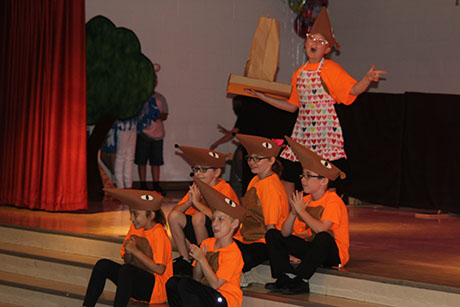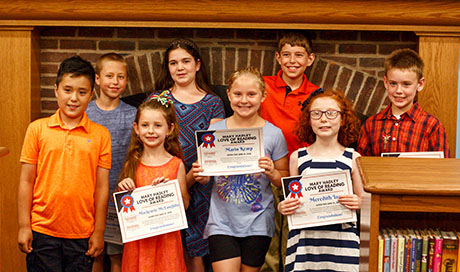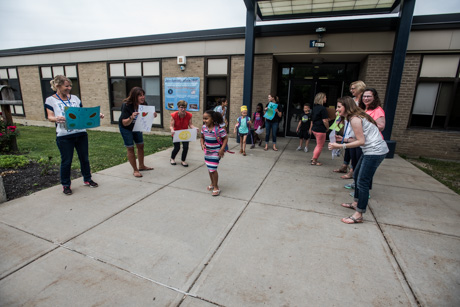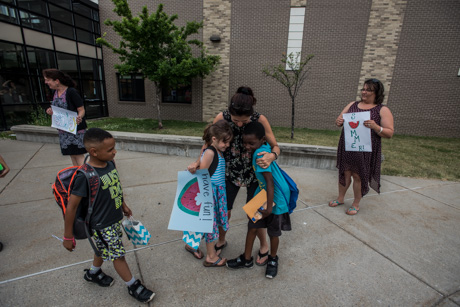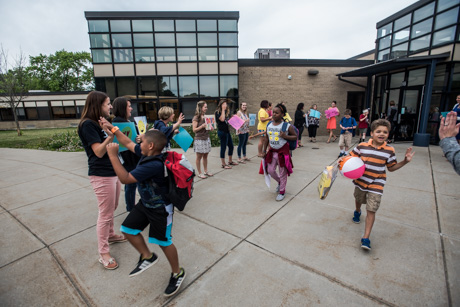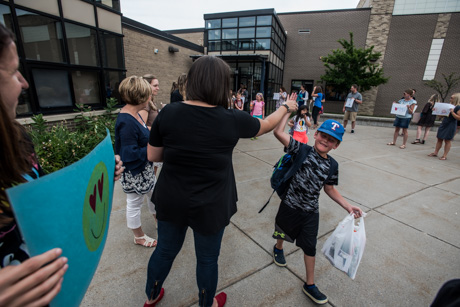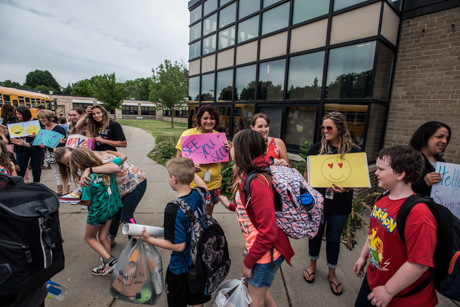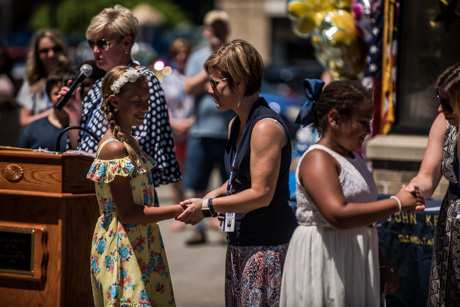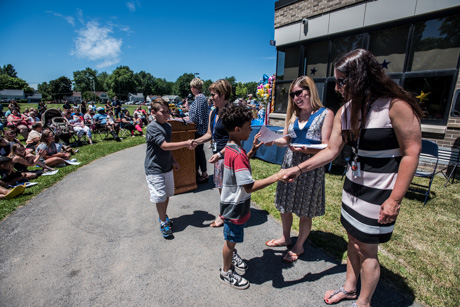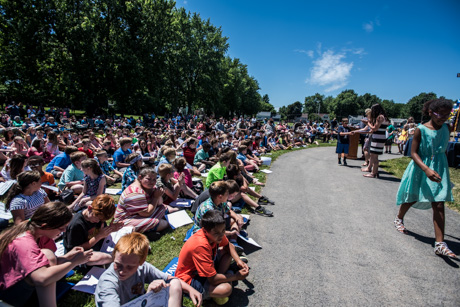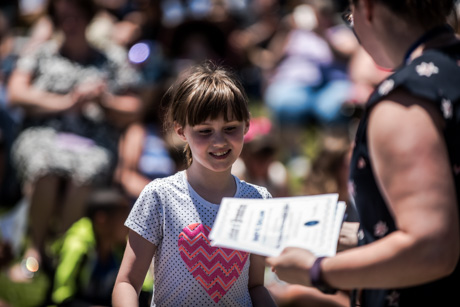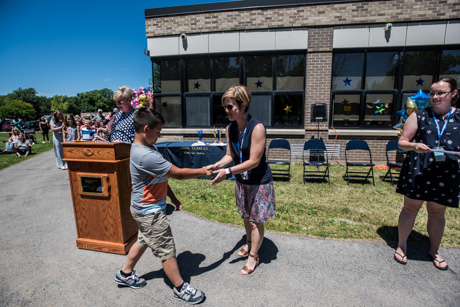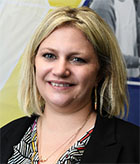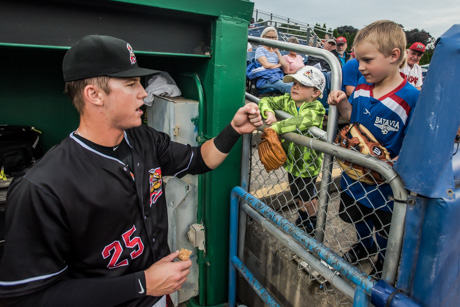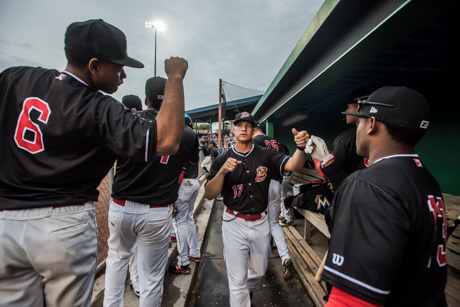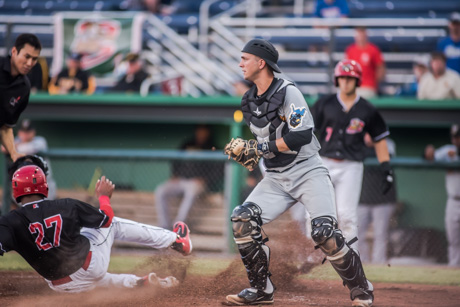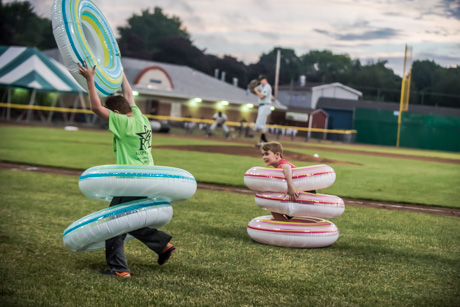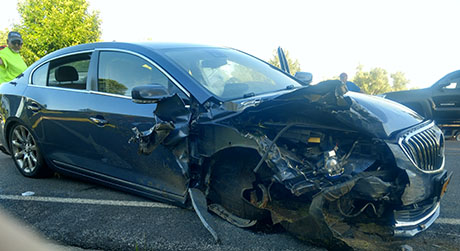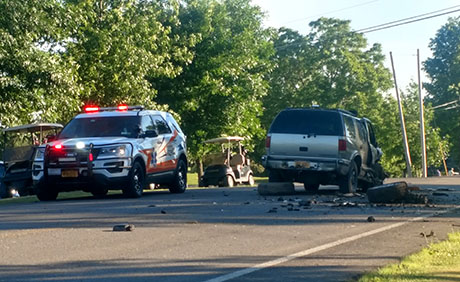The Alexander Central School District is planning on instituting a fee structure for use of school facilities by community groups and that has a number of parents, especially parents of children who participate in sports, upset, according to Lisa Lyons, president of the Tri-Town Youth Athletics Association.
Lyons raised those concerns with the Board of Education on Tuesday night. School board meetings are generally sparsely attended and Tuesday dozens of district residents were in the auditorium for the meeting, though there's no way to say how many were there because of the fee issue.
The fees, at least as announced, would cost the association about $8,000 for football and basketball, according to Lyons (CLARIFICATION: Lyons provided a revised calculation of anticipated association costs after publication of this story) and she asked a number of questions, none of which were answered by board members after she spoke.
"As residents, we pay taxes that are among the highest in the state for a community our size," Lyons said. "Adding in $6,000 in fees, how is this not double dipping? As a nonprofit organization, these fees will close programs for us. The district parents of these children have stated this is unacceptable."
Besides Lyons, there were two other parents who signed up to speak but with the intention of ceding their allotted three-minutes to Lyons, a request Board President Reed Pettys would not allow. One parent, Mary Shepard, tried to read from notes prepared by Lyons once her three minutes were up but Lyons said after the meeting she really didn't get to express all of the concerns that have been raised to her by the parents.
Before the public comments section on the agenda, during what the board calls "roundtable," where each board member can speak on any issue they care to raise, Superintendent Catherine Huber took a few minutes to explain her view on why and how the fees are being initiated.
She said in the fall, the board appointed a committee to review and potentially rewrite the school district's facilities use policy. She said the committee was comprised of board members and school staff who are past and present parents and coaches involved with Tri-Town.
The board minutes for Oct. 18 list board members Rich Guarino, Molly Grimes, Lisa Atkinson, Shannon Whitcombe, Matt Stroud, Tim Batzel, Rob Adam, and Ben Whitmore as members of the committee. The minutes also list Board Member Brian Paris as a member of the committee but he said he declined the appointment because of other business commitments and never attended a meeting.
The policy was adopted by the board in December.
Huber said the prior policy also allowed for a use fee but no fees were ever charged.
"We believed that it was time to start charging a nominal fee to outside organizations, to community organizations to use our facilities," she said.
Huber said she has tried to communicate clearly and work collaboratively with Tri-Town, inviting Lyons in for a meeting, not only to inform them on the need for the new fee but letting them know that the district could be flexible.
"Our goal is all the same," Huber said. "Our goal is to provide a great experience for all the children of Alexander."
She called the fee nominal and said that Lyons continued the conversation in emails back and forth.
"This is the first year for fee structure, so I suggested that if what we were suggesting is not something Tri-Town could bear, I asked Tri-Town to bring to me what could be a manageable solution in terms of a facilities fee."
One issue raised by Lyons is the district's projections for the Tri-Town fees are much lower than Tri-Town's estimation of the fees, based on the documentation they've received.
Huber presented slides showing the fee structure.
The association, she said, would be charged $25 an hour for football, for example, and with four games, that would come to about $300 per game day with an annual cost of $1,200.
The district's costs, she said, is $56 an hour or $650 per game day, with a total of about $2,700 annual. That would still leave the district short its expenses by $1,520.
The cost for basketball, by Huber's numbers, would be $1,920 annually with the district's annual cost at $3,523, for a two-sport charge to the sports association of $3,120, which is less than half of what Lyons estimates it would cost the association. The association uses school facilities only for football and basketball. (CLARIFICATION: This paragraph added after initial publication).
Those numbers, she said, don't include all of the district's costs.
"I think it’s really important that we have those numbers in front of us because as a community, we all want the experience for our students but we also have to understand that it is the responsibility of the board and the administration of the school district to make sure that there are facilities for people to use," Huber said.
"This community has come to expect a certain level of facility maintenance and certain expectations of around our facilities. It would be irresponsible of the board to not have a certain cost-recovery measure in place in order to maintain those facilities long-term."
Lyons said Tri-Town is a 40-year-old organization. She doesn't know how long the association has been using school facilities but it has been many, many years, so it doesn't make sense to her why now, all the sudden, the district needs fees to maintain the facilities.
While Huber is saying the fees are in that $1,500 range (they change some, depending on the sport and facility), Lyons said based on the use application she's been provided and the belief that the two chaperones required for each event, at $18 per hour each, increase the cost, the range is closer to $6,000 per sport annually.
If that is true, use fees for parents per sport will likely double, which will lower participation and mean the end to some sports. The disparity is so great, Lyons said a counteroffer, which Huber said is welcome, is hard to even formulate.
"I understand a nominal fee," Lyons said after the meeting. "I get it. But for us to even try to offer them something at this point, the fees are so astronomical I don’t even know where to start."
One thing that bewilders Lyons and other parents who joined a conversation outside the auditorium after the meeting is the requirement for two chaperones at each event.
"If something is broken, we’ve always paid for it," Lyons said during the hallway conversation. "If something happens, we try to take care of it. If they have a complaint, they’ve come to us and said there were kids running around the school, what can we do, OK we rope it off, we have volunteers wandering the school, making sure kids are in place, so again it’s not that we’re not trying to work with them, we are to the best of our ability."
In the parking lot after the conversation with parents, Huber said the chaperones were necessary because "we want to make sure our facilities are taken care of."
Asked if there were problems in the past that made chaperones necessary, Huber would only say, "We just want to make sure our facilities are taken care of.”
We relayed those comments to Lyons in an email and she said, "I would hope that if there were any issues that came up that I would’ve been informed. To my knowledge, I don’t recall there being anything that wasn't taken care of. Most issues that had come up were 'kid issues' and handled where both parties were satisfied. Issues with any property -- I only know of two and those were taken care of at the expense of Tri-Town and its insurance."
She said one property issue was recent and the other occurred many years ago.
The fees also don't make any sense, Lyons said, because Tri-Town volunteers take care of the facilities before, during and after events.
"The school puts on varsity games on Friday night," Lyons said. "When we get here on Saturday, that field is disgusting. It was lined but we set it up. We have to empty all the garbage cans. We have to get ready. We have our game. We clean up to the best of our ability. So you’re telling me as a school they have to ingest more fees when staff would have to do it on Monday?"
She added, "It’s not fair. When you really look at it, it’s not fair."
Students going through Tri-Town athletics makes the school district better, Lyons said. She said studies show that students who learn teamwork, discipline, and other life skills through sports do better academically.
The association also prepares young athletes to compete eventually at the varsity level -- a point Shepard also made during public comments after picking up the notes from Lyons.
"We have fed your school student-athletes for years," Shepard said. "We have helped put Alexander on the map with many individual wins, sectional wins, regional wins and many patches. How many athletic scholarships have been awarded compared to academic ones?"
Debbie Green said her daughter started with Tri-Town as a cheerleader when she was 5. After four years of cheer in high school, she earned a college scholarship. That is how Tri-Town benefits the school, the kids, and the parents, she said.
Green also noted that under the new fee structure, Girl Scouts, which she is involved with, will wind up paying $100 per meeting to continue meeting at the school.
The Batavian attempted to interview school board members after the meeting to get their indivdual takes on the association's feedback on the policy but we were only able to talk with two before the rest quickly left the building.
"When I’m outside the board and I’m not in session, I’m just an individual but I don’t give interviews," said Vice President Rich Guarino.
Asked if that was because of the district's "One Voice" policy, Guarino said, "Outside of the board, we’re just individuals and I don’t give interviews for anything. I don’t answer surveys on the telephone. I don’t give interviews."
Board Member Brian Paris did answer questions.
Paris said he believes the facilities policy is a work-in-progress, that it's really still in draft form and that the board is working on it.
"I’m not on the committee to develop it, so I don’t have tremendous insight but I do know that a lot of people put a lot of time behind it," Paris said. "I know this board. It’s a very reasonable board. Our goal is not to put any student in a position where they are not able to participate in any of these activities."
Lyons, Green, and Donna McArthur, who has been with Tri-Town for 42 years, said it's expensive enough being a parent of a student-athlete. Besides fees, there's equipment, training, travel, and other expenses that add up.
For the association, there are also expenses the district may not be considering, from insurance to recertifying football helmets every three years. And, McArthur said, the association has always made sure every kid who wants to play gets to play.
“We never have a child that does not play," McArthur said. "If they can’t pay as parents, we all kick in. We find them shoes, we find them a glove, no kid has ever been turned away.”
And community members help the school district in other ways. It was community members who did the fundraising in the 2000s for Chris Martin Memorial Field of Dreams, which is used by the district's football, softball, baseball and soccer teams.
For all these reasons, Lyons said, district parents aren't happy with what they see as astronomically high use fees.
"There has to come a point where, yes, there is that collaborative conversation," Lyons said. "But as a district, these parents are pushing back because they know that this organization cannot afford those fees. As parents, with that 99.6 percent of kids who are playing who are district kids, they’re already paying for this school. They don’t want to pay any more for it."

